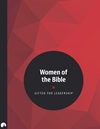Born to Follow?
At a very early age I came to understand that as a female, I was born to follow. "Men lead. Women follow." That's what I was taught. It didn't matter that I was the pastor's daughter, even though PK's are often leader-types. My three brothers each took a turn as president of the youth group at church. Not me. I knew my place. Girls aren't supposed to lead. Even being in the first class of women at Dallas Theological Seminary didn't dislodge me from the conviction that as a woman I was born to follow - follow my husband (if one showed up) and follow male leadership in the church.
Oh, sure, I knew about Deborah, Esther, and Priscilla. But their stories were always accompanied by the explanation that these women were "exceptions." Christian women weren't supposed to get any big ideas from studying their lives. Usually one or more qualifiers followed: They weren't actually doing as much as it seems; they were stepping into a male leadership vacuum and actually were a punishment on the men; this was a unique moment in time and not intended to establish any pattern. So these strong female leaders were carefully set aside as role models for women today.
What surprises me, as I think back over my life, is the fact that having the follower mentality drummed into me was actually a great way to prepare me for the day I would discover God created women to be leaders too. The first and most important lesson in leadership is not being told you were born to lead (or participating in competitive sports), but learning you were born to follow.
God's creation call for his image bearers - male and female - to rule and subdue the earth couldn't be a clearer mandate for leadership. But the only way to become the leaders God desires is first and foremost to become his followers. Jesus' first words to the men he chose as leaders was, "Follow me."
The person who finally taught me to think of myself as a leader was a woman whose first recorded act in the Bible was to establish herself irrevocably as a follower. When instructed by her mother-in-law Naomi to return to Moab and to her gods, Ruth the Moabitess dug in her heels and proved immovable. This is when Ruth binds herself to follow Yahweh.
If any woman was ever qualified to take a back seat in life, Ruth was that woman. She was a foreigner, a recent convert, a newcomer in Israel, widowed (meaning she had no voice, no legal rights, no place in society) and barren (as a woman she had nothing to contribute). All reasons to excuse herself from any thoughts of leadership. But Ruth didn't let an unpromising resume stop her. Instead of maintaining the deferential, passive, clinging image we have wrongly ascribed to her, she is gutsy, bold, and astonishingly assertive, and all because underneath her sights were set - not on securing a top spot for herself - but on doing whatever it took to live as a true follower of God in this world.
As a result, she emerges as a powerful influence in the lives of Naomi, Boaz, and the rest of the Bethlehem community. Her actions bless everyone in her path and ultimately change the world for, unbeknown to her, she is rescuing the royal line of Christ.
Ruth's example establishes a pattern that goes against common assumptions about what female leadership will do to men. When the first calling and greatest passion of a female leader is to follow Jesus, the men in her life won't suffer the fears we hear recited all the time: that they will be displaced, emasculated, or feminized. To the contrary, they become better men.
There is no male leadership vacuum in the Book of Ruth. Boaz is a true leader when he makes his entrance in the story - a man to be admired for all the right reasons. When he exits the story (after repeatedly following Ruth's lead), he has attained new and higher levels of godliness and is honored as the great-grandfather of King David and the worthy ancestor of Jesus.
Deborah's heart belongs to Yahweh, and so she calls and accompanies a reluctant Barak into battle. Barak makes the Bible's Hall of Fame (Hebrews 11:32) for great men and women of faith.
Esther overcomes her fears to answer God's call on her life. She confronts her husband (a man with the power to take her life if it suits his mood) and overthrows Haman, the second most powerful man in the world, and his genocidal plots against her people. Her ascendance to power makes King Xerxes a wiser ruler and exalts her noble cousin Mordecai to a position of great stature and world power.
In Priscilla's unbending commitment to the teachings of Jesus and Paul, she partners with her husband in setting Apollos straight in his teaching. Together they strengthen Apollos to proclaim the gospel to countless people.
I no longer believe leadership belongs exclusively to men. God calls all of his daughters to lead. But the leadership we offer to others will only be as good as our ability to follow - to follow the one who created us to lead.
So go ahead. I don't mind if you tell me I was born to follow.












